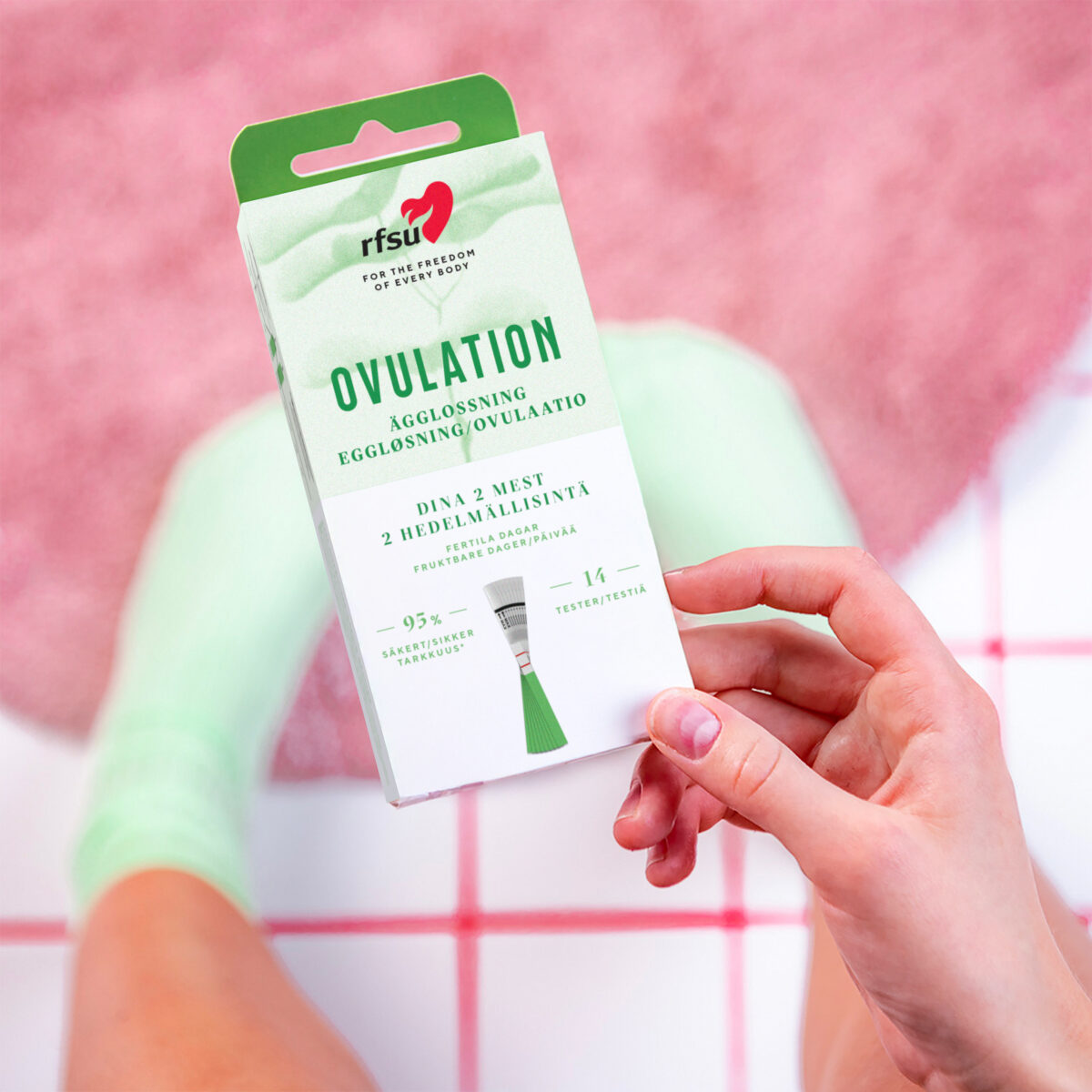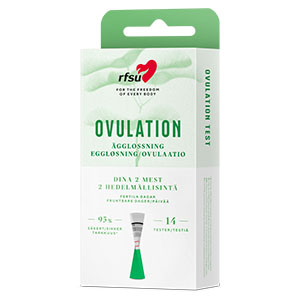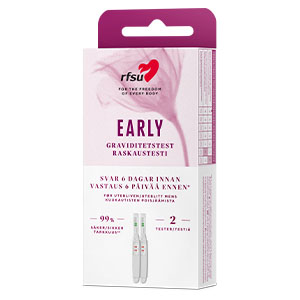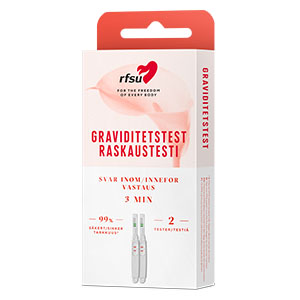Ovulation calendar – calculate when you are ovulating
With our ovulation calendar, you can easily calculate when you are ovulating and your most fertile days. It is a practical tool for those trying to get pregnant and who want to know the days when they have the greatest chance of getting pregnant. An egg can be fertilized for a maximum of 24 hours, but sperm usually live for several days. Therefore, it can be good to have intercourse / introduce sperm 2-3 days before ovulation, up to 1-2 days after.
Ovulation calendar
Here you can find out your ovulation date and the days on which you have the best chance of getting pregnant during intercourse. The dates in the calendar are approximate and may differ from reality, especially if you have an irregular menstrual cycle.
You have the highest chance to get pregnant
- Menstruation
- Ovulation (highest chance of getting pregnant)
- Fertile days (chance of getting pregnant)
How to calculate when you are ovulating
You can calculate approximately when ovulation will occur, based on your first menstrual day. You can do this quickly and easily via the ovulation calendar above. Ovulation usually occurs 14 days before the next period. If you have an irregular menstruation cycle you can enter both the longest and the shortest menstrual cycle to see how the calculated fertile days vary.
The time from ovulation to the next period does not actually vary much between women. It usually lasts 14 days. But the time from the first day of your period to ovulation can vary quite a bit! This is because the total length of the menstrual cycle can vary between 25-32 days for women.
Example: if you have a regular menstrual cycle that is 25 days long, ovulation will occur around day 11. But if your menstrual cycle is 30 days long, ovulation will not occur until around day 16.
When do you ovulate? Do a test!
When do you ovulate? This is a common question for people trying to get pregnant. Some people experience symptoms such as a throbbing pain in the lower abdomen or a slight bleeding, others feel nothing at all. So these symptoms should not be taken as a sure sign that you are ovulating. Because, as said, ovulation can happen without you realising it at all.
Therefore, the best way to find out when you are ovulating is to use an ovulation test. The test measures the level of LH hormone in your urine, which rises just before the egg is released from the ovary. A positive test indicates that you are approaching your most fertile days. If you have irregular periods, it can be particularly difficult to calculate ovulation on your own. In this case, RFSU’s ovulation test is a good tool for identifying your fertile days, regardless of how regular your cycle is.
When is the best chance of getting pregnant?
The most fertile period occurs in the days just before and during ovulation. The egg can only be fertilised for up to 24 hours, but the sperm can stay in the womb for several days waiting for the egg. This means that the chances of getting pregnant are highest if you have sexual intercourse or insert sperm three days before or on the day of ovulation.
To find out when you have the best chance of getting pregnant, you can use our ovulation calendar above. It will help you calculate when you ovulate based on your menstrual cycle. If you have an irregular cycle, you can combine the calendar with ovulation tests that show the increase in the LH hormone, which is a sign that ovulation is near.
While it can be stressful to try and time the right day, the most important thing is to have intercourse regularly throughout the fertility window. Having intercourse 2-3 times a week increases the chances and can make the process less pressurised.
When do you ovulate after your period?
After your period, your body starts preparing for a new pregnancy opportunity. The first thing that happens is that the hormone FSH increases, causing a new egg to start maturing in the ovary. For many people, ovulation occurs around 12-16 days before their next period, which usually means that ovulation occurs around 10-16 days after the first day of your period – depending on how long your cycle is.
For those with a regular cycle, it is often easier to predict when ovulation will occur. But even if your cycle varies a little from month to month, you can still get a rough idea of when you’ll ovulate by counting from your period. Feel free to use an ovulation test or an ovulation calendar if you want more help to pinpoint your most fertile days.
How do I know I am ovulating?
Some people know when they are ovulating. They get, for example, pain in the lower abdomen and sometimes a little bleeding. But these symptoms are not completely sure signs. To know exactly, neither symptoms nor calculating a probable date of ovulation are enough. You can use an ovulation test that shows when LH hormone is present in the urine, which is a sign that ovulation is close.
If you have irregular periods, it can be extra difficult to calculate when you will ovulate. In such instances, ovulation tests are a good tool.
How long does ovulation last?
Ovulation is actually a rather short event in the body. The egg itself is released from the ovary at a specific time and can only be fertilised for a limited window of time. After the egg is released, it is fertilisable for about 12 to 24 hours. After that, it can no longer lead to a pregnancy.
However, as sperm can survive for up to 5 days inside the womb, you still have several days in each cycle when you have a chance of getting pregnant. This is why we usually talk about a fertile period of about 4-6 days – the days before ovulation and the day after. Understanding how long it takes to ovulate can help you to better plan sexual intercourse if you are trying to get pregnant. Many people use ovulation tests or digital tools to get a more accurate idea of their fertile period.

When is the greatest chance of the egg being fertilized?
It is best to have intercourse or introduce sperm from about 3 days before and on the day of ovulation itself, because the egg can be fertilized for a maximum of 24 hours. Then there is the greatest chance that the egg will be fertilized.
When the egg is released, it is caught by the fallopian tube and travels down to the uterus. During this migration, it can be fertilized by the sperm. The egg is fertilizable for one and a half to one day. If the egg is not fertilized, it lives for about a day.
But the sperm can live inside the uterus for several days! They can wait in there for the egg to arrive. Therefore, it is better to have intercourse 2-3 days a week, regardless of which day of the menstrual cycle it is, than to try to pinpoint the exact day of ovulation.
What happens if the egg isn’t fertilized?
Once the egg has been released from the ovary, the ovarian cyst transforms into the corpus luteum, which produces hormones that are important for building up the lining of the uterus.
If no egg has been fertilized and stuck in the mucous membrane, the corpus luteum is no longer needed. Then it shrinks and the amount of corpus luteum hormone drops. This is the signal that causes the mucous membrane to be ejected as a hemorrhage and you get a period.
Facts on ovulation
After a period, the production of the hormone FSH (follicle stimulating hormone) increases in the pituitary gland. The hormone affects the ovaries and causes the egg to mature inside its cyst in the ovary.
During the time that the egg matures, the ovaries in turn increase the production of the female hormone estrogen. This hormone also causes the mucus in the cervix to change. The mucus becomes easily permeable so that sperm can get through and also makes it easier for them to survive. The high estrogen levels also affect the pituitary gland, which signals the ovaries via the hormone LH (luteinizing hormone) that ovulation should occur.
When the follicle (follicle) ruptures, the egg is released. The follicle transforms into a small organ, the corpus luteum, in the ovary. The corpus luteum produces hormones. The most important hormone is corpus luteum hormone (progesterone), which causes the lining of the uterus to grow and prepare to receive the fertilized egg.
Source: www.1177.se and fact-checked by RFSU clinic













